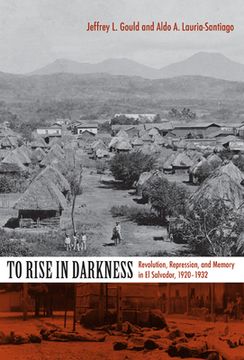Compartir
to rise in darkness,revolution, repression, and memory in el salvador, 1920-1932 (en Inglés)
Aldo A. Lauria-Santiago
(Autor)
·
Jeffrey L. Gould
(Autor)
·
Duke University Press
· Tapa Blanda
to rise in darkness,revolution, repression, and memory in el salvador, 1920-1932 (en Inglés) - Lauria-Santiago, Aldo A. ; Gould, Jeffrey L.
$ 43.840
$ 79.700
Ahorras: $ 35.860
Elige la lista en la que quieres agregar tu producto o crea una nueva lista
✓ Producto agregado correctamente a la lista de deseos.
Ir a Mis Listas
Origen: Estados Unidos
(Costos de importación incluídos en el precio)
Se enviará desde nuestra bodega entre el
Lunes 17 de Junio y el
Jueves 27 de Junio.
Lo recibirás en cualquier lugar de Chile entre 1 y 3 días hábiles luego del envío.
Reseña del libro "to rise in darkness,revolution, repression, and memory in el salvador, 1920-1932 (en Inglés)"
To Rise in Darkness offers a new perspective on a defining moment in modern Central American history. In January 1932 thousands of indigenous and ladino (non-Indian) rural laborers, provoked by electoral fraud and the repression of strikes, rose up and took control of several municipalities in central and western El Salvador. Within days the military and civilian militias retook the towns and executed thousands of people, most of whom were indigenous. This event, known as la Matanza (the massacre), has received relatively little scholarly attention. In To Rise in Darkness, Jeffrey L. Gould and Aldo A. Lauria-Santiago investigate memories of the massacre and its long-term cultural and political consequences. Gould conducted more than two hundred interviews with survivors of la Matanza and their descendants. He and Lauria-Santiago combine individual accounts with documentary sources from archives in El Salvador, Guatemala, Washington, London, and Moscow. They describe the political, economic, and cultural landscape of El Salvador during the 1920s and early 1930s, and offer a detailed narrative of the uprising and massacre. The authors challenge the prevailing idea that the Communist organizers of the uprising and the rural Indians who participated in it were two distinct groups. Gould and Lauria-Santiago demonstrate that many Communist militants were themselves rural Indians, some of whom had been union activists on the coffee plantations for several years prior to the rebellion. Moreover, by meticulously documenting local variations in class relations, ethnic identity, and political commitment, the authors show that those groups considered "Indian" in western El Salvador were far from homogeneous. The united revolutionary movement of January 1932 emerged out of significant cultural difference and conflict.

